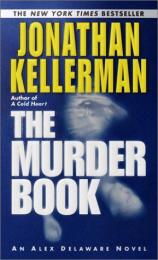The Murder Book
Review
The Murder Book
If you have never read any of the works of Jonathan Kellerman, read the excerpt of the first eight pages that we have here. You're going to want to keep reading, so be prepared to click on the "buy icon" to get your own copy. This is not a book to borrow. You're going to want to keep this one for yourself, to be read and reread. These opening eight pages, an account of a romantic relationship going quietly off of the rails despite the efforts of the two people involved to keep things on track, are the reason why one reads Jonathan Kellerman.
Now, THE MURDER BOOK is what is referred to in the trade as "A Novel of Suspense," which means that there will be passages that you won't want to read over a meal, especially if the meal has any sort of a meat dish as an integral part. Of course, you can get that sort of writing from the work of many excellent authors. What sets Kellerman apart is his ability to slice in and out of the relationships while using the contemporary culture of Southern California as a backdrop.
As a reference point, think of Ross MacDonald's Archer novels, which functioned not only as an archetypal template for the hard-boiled detective novel but also as a volume-by-volume documentary of where Southern California in general and Los Angeles in particular were --- and where they were heading. Kellerman's Alex Delaware novels have been quietly continuing that project and, if I can make so bold a statement, with equal stature. There is perhaps no better example of this than THE MURDER BOOK.
The Murder Book referred to in the title is anonymously sent to L.A. Detective psychologist Delaware in the mail. It consists of crime scene photographs of murder victims, with a terse statement of circumstance captioned under each. Delaware shows the book to his friend and occasional partner, L.A. Homicide detective Milo Sturgis. One picture catches Sturgis's eye, and his memory. It is the picture of a teenage girl, unspeakably mutilated and brutally murdered. It is a picture of a crime scene that Milo investigated as a rookie some 20 years ago, a crime that he and his partner at the time had only begun to investigate when they were suddenly and mysteriously pulled off of it, split up, and reassigned to different districts. Sturgis moved on, but the reminder of the girl, and the fact that he had never closed the case, reawakens the case for Sturgis.
He and Delaware unofficially reopen the matter in order to determine what really happened two decades ago. The file, however, has mysteriously vanished. The duo doggedly pursues what few leads they have. The trail seems to lead to a rich and powerful family whose daughter had a history of quiet, hidden madness. As Sturgis and Delaware begin to uncover a hidden history related to the last hours of a now-forgotten murder victim, however, they find that their movements are being tracked and that their lives are in jeopardy. The facts that they are uncovering ripple far beyond the tragic event of the past. The dangers resulting from their investigation --- and the secrets that the investigation is uncovering --- are immediate and consequential.
Kellerman, with THE MURDER BOOK, continues to document the slow, inexorable moral decline of Southern California, a decline that is at once shunned and embraced by its residents as if they have fallen under the spell of a silent siren. At the same time, he nicely balances the investigation with the constantly evolving saga of Delaware's personal life. The result is a presentation of characters whom the reader comes to personally know and care about, in a city of the heart.
Reviewed by Joe Hartlaub on April 1, 2003





